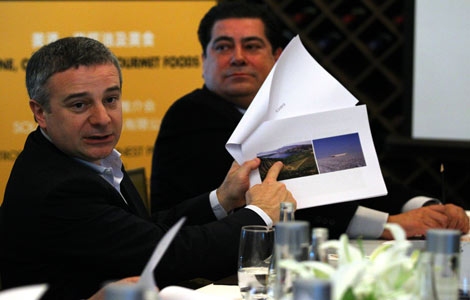|
 Joaquim Vila Betriu (left), director and owner of Vila Viniteca, introduces Spain's exclusive geography, which provides a special environment for grape planting. [Photo by Zou Hong / China Daily] |
Attracted by Chinese consumers' growing demand of wines, a top Spanish wine distributor plans to tap into the world's second-largest economy.
Vila Viniteca, one of the largest wine distributors in Spain and the third largest wine producer in the world, has set up a branch in China via co-managing with a Sino-Spanish commercial office, a Qingdao-based commercial organization which has run trades between the two countries for decades.
"Although China is the world's largest market, our aim is not only to sell quality wines at good prices, but principally to cultivate the Chinese palate to truly savor and enjoy the centuries-old tradition of wine in all of its flavors and aromas," said Joaquim Vila Betriu, director and the third-generation owner of Vila Viniteca, which was founded in 1932.
Betriu, an expert on wine, said the company, with more than 7,500 references of wine, will provide China's market a wide range of wine, from economically accessible kinds to the most luxury ones.
He added that consumers should not only judge wine by price, but also pay more attention to the culture carried by wine.
"Wine, as one of the longest-living diets, can provide a platform for people to communicate across distance and time," he said, "A same bottle of wine can provide different tastes, when the same drinker is in different mood."
Esteve Solanes, chief representative of the Qingdao-based office, said a six-month research, with collected information from several leading marketing research agencies, has been done to personalize the company's offer to "what the Chinese consumers truly enjoy".
He added that the exclusive temperature and geography of Spain give its wine special flavors.
China's imports of bottled quality wine from Spain grew faster than from any other country in 2011, lifting Spain to the third largest source from the fifth in 2010, statistics from the General Administration of Customs showed.
